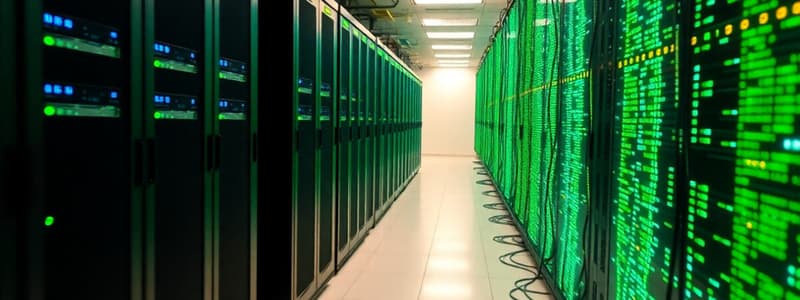Podcast
Questions and Answers
What is a primary function of servers in a network?
What is a primary function of servers in a network?
- To increase the number of users on the network
- To manage access to network resources (correct)
- To only handle email communications
- To store all data in the cloud
Which of the following is NOT a common server role mentioned for managing network resources?
Which of the following is NOT a common server role mentioned for managing network resources?
- Configuring access for printers
- Monitoring network speeds (correct)
- Hosting a website
- Managing file access and permissions
What protocol can be used for remote access to network folders?
What protocol can be used for remote access to network folders?
- FTP (correct)
- SMTP
- HTTP
- SNMP
In server roles, what is required to explicitly deny users access to certain folders?
In server roles, what is required to explicitly deny users access to certain folders?
Which web server platform is commonly used for Microsoft servers?
Which web server platform is commonly used for Microsoft servers?
What are the three components of network security?
What are the three components of network security?
What type of server role allows an organization to manage its own website?
What type of server role allows an organization to manage its own website?
Which of the following statements is true regarding folder sharing on a server?
Which of the following statements is true regarding folder sharing on a server?
What does DHCP lease time refer to?
What does DHCP lease time refer to?
Which protocol is primarily used for sending outgoing emails?
Which protocol is primarily used for sending outgoing emails?
Why is it important to set DHCP leases for devices on a guest network to a short time?
Why is it important to set DHCP leases for devices on a guest network to a short time?
What is the primary function of a default gateway in a network?
What is the primary function of a default gateway in a network?
What role does DKIM play in email protection?
What role does DKIM play in email protection?
Which of the following mechanisms does SPF utilize to validate email senders?
Which of the following mechanisms does SPF utilize to validate email senders?
How does DMARC enhance email protection over DKIM and SPF?
How does DMARC enhance email protection over DKIM and SPF?
What function does IMAP serve among the given email protocols?
What function does IMAP serve among the given email protocols?
What happens to an IP address that is leased to a device until the lease expires?
What happens to an IP address that is leased to a device until the lease expires?
What is the key benefit of defining a DNS server in a DHCP scope?
What is the key benefit of defining a DNS server in a DHCP scope?
What purpose does a syslog file serve in a network?
What purpose does a syslog file serve in a network?
Which statement correctly describes a Fully Qualified Domain Name (FQDN)?
Which statement correctly describes a Fully Qualified Domain Name (FQDN)?
What role does DNS play in network communications?
What role does DNS play in network communications?
In a DNS zone, what is the purpose of an A record?
In a DNS zone, what is the purpose of an A record?
What is required to set up a DHCP server on a network?
What is required to set up a DHCP server on a network?
What does an MX record in DNS identify?
What does an MX record in DNS identify?
Which of the following is NOT part of a Fully Qualified Domain Name (FQDN)?
Which of the following is NOT part of a Fully Qualified Domain Name (FQDN)?
What is a reverse lookup zone used for in DNS?
What is a reverse lookup zone used for in DNS?
How does a CNAME record function in DNS?
How does a CNAME record function in DNS?
What information does a Start of Authority (SOA) record contain?
What information does a Start of Authority (SOA) record contain?
What is the purpose of exclusions in a DHCP scope?
What is the purpose of exclusions in a DHCP scope?
Which type of DNS record is responsible for identifying the authoritative server for a domain?
Which type of DNS record is responsible for identifying the authoritative server for a domain?
What does a DHCP server assign to a newly connected device on the network?
What does a DHCP server assign to a newly connected device on the network?
What is the primary use of a PTR record in DNS?
What is the primary use of a PTR record in DNS?
Flashcards are hidden until you start studying
Study Notes
Server Roles Overview
- Servers are crucial components in networking, capable of managing multiple roles or a specific function.
Access Roles
- Servers manage access to a variety of network resources, including files, folders, printers, and websites.
- File Sharing: Servers enable storage of files in shared folders, allowing permissions like read-only, write access, or full control.
- Printer Management: Servers can supervise network printers, ensuring security settings and monitoring usage for efficient printing.
- Web Hosting: Organizations often maintain their own web servers using platforms like Microsoft’s Internet Information Services (IIS) or Linux’s Apache.
Network Security
- Network security focuses on three main components: authentication, authorization, and accounting (AAA).
- System log files (syslog) record significant events on the network, detailing the nature of the event, the user involved, and the timestamp.
Domain Name System (DNS)
- DNS translates hostnames into IP addresses, simplifying how users access computers and websites.
- Hierarchical structure of DNS includes root level, top-level domains (TLD), unique domain names, and specific hostnames.
- Fully Qualified Domain Name (FQDN) example: www.testout.com represents the complete path in the DNS hierarchy.
DNS Components
- DNS zones maintain domain namespaces, managing subdomains and specified records.
- Types of DNS records include:
- A Record: Links IPv4 hostnames to IP addresses.
- AAAA Record: Links IPv6 hostnames to IP addresses.
- CNAME: Provides alternate names for existing host records.
- MX Record: Identifies servers responsible for handling email.
- TXT Record: Stores plaintext notes for preventing spam or verifying domain ownership.
Dynamic Host Configuration Protocol (DHCP)
- DHCP automates IP configuration assignment for devices on a network.
- DHCP scope defines parameters like IP range, subnet mask, and exclusions for devices needing static IPs.
- DHCP lease time determines how long an IP configuration is assigned; leases can be set from hours to months.
Mail Servers
- Email servers utilize protocols like SMTP (outgoing), POP3 (incoming), and IMAP (incoming, multi-device access).
- Spam prevention technologies include:
- DomainKeys Identified Mail (DKIM): Verifies sender's domain; uses encryption keys for validation.
- Sender Policy Framework (SPF): Protects against spoofing by verifying authorized IPs for sending emails.
- Domain-based Message Authentication, Reporting, and Conformance (DMARC): Combines DKIM and SPF to enhance email security.
Studying That Suits You
Use AI to generate personalized quizzes and flashcards to suit your learning preferences.




